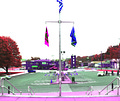August 26: "The all-powerful arm of scalable oppression"
Defunding the police means de-weaponizing white supremacy
Hi. Remember these? There’s a lot to catch up on since last time, but for now I wanted to keep it quick. An article worth reading and a song worth hearing. We’ll get back to regularly scheduled programming soon. Hope you’re well.

The clipping below comes from an article published earlier this month in The New Republic by Kimberlé Williams Crenshaw, founder of the African American Policy Forum. Read the whole thing and sit with it for a while.
While you do, check out Frank Ocean’s “Pyramids” from his breakout 2012 album Channel Orange. Crazy to think that this track (and the rest of what is almost unanimously considered a perfect album) is more than eight years old now. It feels like a good time in general to revisit the classics, whichever yours are, and remember other times you revisted them and where you were and who was there and how it all felt. Fond memories are free.
Thanks again for reading, and look out for another full letter coming soon. Here’s Crenshaw:
The summer of 2020 will be recorded as a once-in-a-generation uprising against police brutalization of Black people. The multiracial protests that erupted in all 50 states seemed to break the embargo—at least momentarily—against the official acknowledgment of the continuing legacy of anti-Black racism in American policing. Fueled by the video-capture of the casual hand-in-the-pocket–style murder of George Floyd, this mass repudiation might be read as an expression of the humanitarian values that the brutal slaying of Floyd flagrantly violated. But as the 24-hour coverage and daily analysis of the uprising revealed, the regime that produced Derek Chauvin and the still-uncharged killers of Breonna Taylor is not a broken one: It continues to work as it was designed to.
The deeper functions of American policing were revealed every night that breathless reporters told harrowing stories of protesters smashing windows with considerably more urgency than they relayed news of police officers smashing heads. Not even the frightening descent into a lawless police state could trump the anxiety over a possible takeover from the bottom. Cable TV viewers watching the commentary and recaps of the president’s terroristic attack on peaceful protesters in front of the White House by an unidentified national police force were suddenly interrupted with the urgent story of a local drugstore break-in on the other side of the country—the perpetrators having long since departed from a scene that was miles from any active protests.
The reflexive treatment of erratic outbreaks of looting as a more ominous threat than the organized massing of state terror also speaks volumes about the nation’s real civic priorities. Consternation over the loss of goods rather than the incalculable loss of eyes, limbs, and lives points to the bedrock realities on which modern policing is built. It was not simply that the vicious response of police to the mass protest (while the entire world was watching) was unexceptional. It was the violence-enabling pearl-clutching about looming social disorder that reminded us yet again that mainstream thinking is just as powerfully organized around the fear of the bogeyman as the nightmares of childhood are. This particular bogeyman is a phantom born of slavery, a fear embedded in the DNA of post-slavery society grounded in the recognition that orchestrated and professionalized violence might not be enough to preserve the shaky foundations of racial hierarchy.
The fear of being outnumbered and overrun by the indignant and unforgiving masses is that thing that goes bump in the night—the gnawing insecurity that the paddy rollers in the antebellum countryside would take care of while the misnamed keepers of the peace tucked in the owners and the elites for the night. Generation after generation, they do their work out of sight, as the descendants of the slaves and the descendants of the guardians play the same unchanged roles, only occasionally brought into unforgiving light by the dawn of freeze-frame technology. — The New Republic
Dont look away. Tomorrow is another day.


